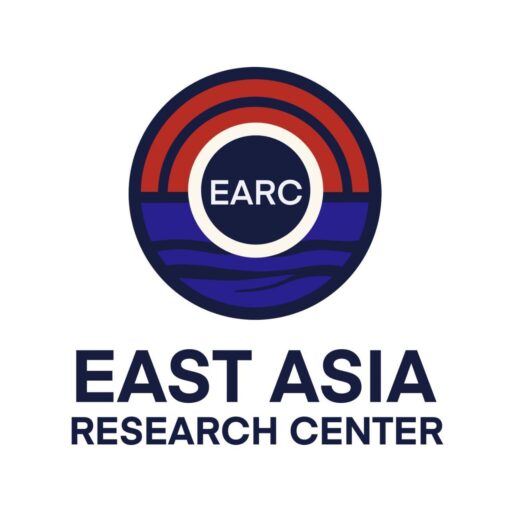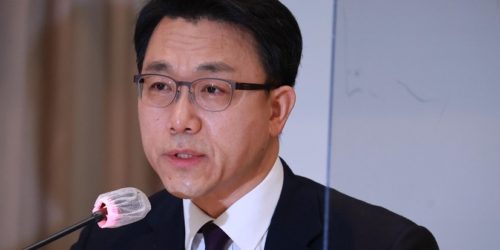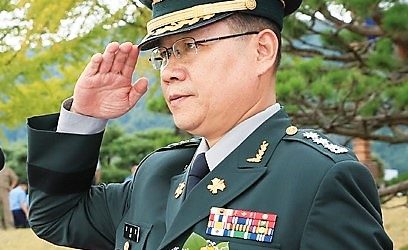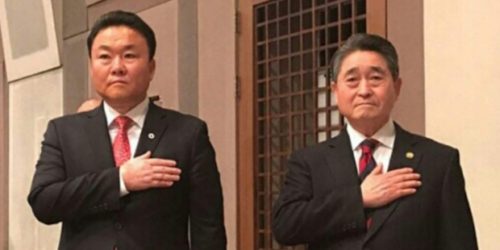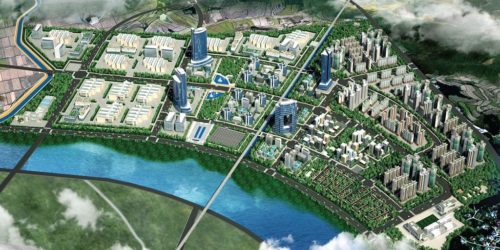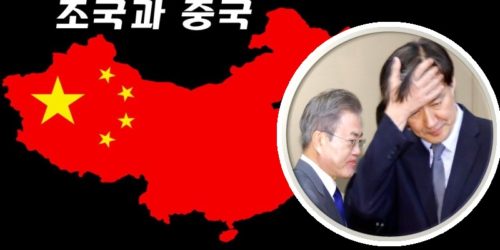South Korea’s Ruling Party, Smaller Opposition parties Agree to Fast Track Bills to Create Additional Independent Investigative Body Akin to North Korea’s Secret Police, Increase Unelected Officials, Silence Discussions on the 5.18 Gwangju Incident
2019-4-25, Tara O
On April 8, 2019, the ruling Deobureo Minjoo Party (Democratic Party) threatened that if the election system reform agreement is not reached by April 10, 2019, then it would go ahead and exclude the Liberal Korea Party, and will designate the electoral reform plan as a “fast track” with the three minor opposition parties–Bareunmirae (Correct Future) Party (formed in 2018 by merger of the People’s Party and members who defected from the Saenuri Party), the Democracy and Peace Party (formerly People’s Party until 2018), and the Justice Party (its base is the Korean Confederation of Trade Unions).
The four parties indeed excluded the Liberty Korea Party and agreed on April 22 on a package deal to fast track certain bills. This process allows the National Assembly to put a bill that fails to gain support on a “fast track” if it gets 3/5 of the votes. The National Assembly currently has 300 seats, so 3/5 is 180 votes. The main opposition party, the Liberty Korea Party, has 114 seats; at least 121 votes would be needed to oppose a fast-tracked bill. Liberty Korea Party calls this arrangement among the four parties a “Legislative Coup d’etat.” (0:05)
The fast track could bring changing the constitution one step closer, which failed to pass the last time. The Deobureo Minjoo Party and Moon Jae-in wanted to change the constitution early last year, including deleting the words “freedom” and “free market economy,” adding “social economy” and “equal democratic society,” and prohibiting layoffs and dismissals from work.
Bills to be considered for Fast Track
1. Creation of an independent investigative body that investigates high-level officials called Gongsoocheo (공수처, short for 고위공직자비리수사처)
Currently, the prosecutor would investigate and prosecute corruption, abuse of authority and other illegal activities. Pro-Moon administration media has portrayed Gongsoocheo (an investigative body targeting senior officials) as a necessary and just entity that can check corrupt prosecutors who do not faithfully serve the public, but are influenced by political powers. Senior Presidential Secretary for Civil Affairs Cho Kuk (조국) has stated that the creation of Gongsoocheo is the “demand of the candlelight revolution” and denied it would be used to oppress political opponents.
The example of the judge Seong Chang-ho (성창호), however, does not suggest this is the case. Judge Seong found Kim Kyung-soo (김경수) guilty in the Druking case of computer manipulation on a massive scale, influencing public opinion during the 2017 presidential campaign. Judge Seong remanded Kim to jail early this year. Kim Kyung-soo was the governor of South Kyeongsang Province when he was investigated and a close associate of Moon Jae-in who worked on Moon’s last presidential campaign. Soon after Judge Seong found Kim Kyung-soo guilty, the judge himself was investigated and put on trial. The Liberty Korea Party National Assemblyman Joo Kwang-deok (주광덕) called this a “revenge prosecution.” Kim Kyung-soo meanwhile has been freed on bail. Thus, a senior political figure or public official, such as a judge, prosecutor, police commissioner, or general, who are deemed political enemy can be investigated and prosecuted by Gongsoocheo.
The composition of the Gongsoocheo members can also be problematic. The majority of the seven-member Gongsoocheo committee would likely be filled with supporters of Moon Jae-in and the Deobureo Minjoo Party. The seven members could be nominated to the committee as follows: (3:10)
- Minister of Justice (nominated by Moon): 1
- National Court Administrator (appointment by Supreme Court Justice Kim Myung-soo, who was appointed by Moon): 1
- Korean Bar Association President: 1
- National Assembly: 4 (Exactly how many from which party depends)
- Deobureo Minjoo Party (Democratic Party): 1-2
- Liberty Korea Party: 1-2
- Justice Party: 1
- BareunMirae Party: 1
Under this arrangement, the committee would already be politically tilted, and is similar to the “road map” of Moon Jae-in administration’s media control plan, in which political or ideological supporters form the majority of committees in order to control the entity. The head of Gongsoocheo would be appointed by president Moon. (5:35)
National Assemblywoman Lee Un-ju (이언주), Bareunmirae Party, described this as similar to North Korea’s system of monitoring and investigating senior officials, the Ministry of State Security (MSS). (5:05) In North Korea, the Ministry of Public Security (MPS) focuses on the public at large, while MSS targets the elites, and yet another entity, Military Security Command monitors and investigates the military. These entities compete with each other to ensure loyalty to the North Korean leader through fear.
Even the current situation of increased political investigations is scary, Lee Un-ju said, but Gongsoocheo only targets senior officials. Within the Justice Ministry, there still could be judges and prosecutors with a conscience, she said, and would try to follow the law, but if they are targeted by Gongsoocheong, it would be difficult for them to do their jobs properly because they would face pressure. (5:36) Essentially, it is a road to authoritarianism. (6:56) Assemblywoman Lee announced she is leaving the party. She stated that Bareunmirae initially did not support the creation of Gongseeocheo. But the Deobureo Minjoo Party enticed them with “election reform” in which it calls for more proportional representatives.
Among the various laws discussed, creating Gongsoocheo is Moon Jae-in’s and Cho Kuk’s top priority.
2. Proportional Representation system change
Proportional representatives are not directly elected, but are appointed by political parties based on the percentage of a party’s overall votes received. During the elections, people vote not only for a specific candidate, but also for a party. From the latter comes the proportional representatives that the parties choose. (1:30)
The Minjoo Party wants to decrease the election districts from 253 to 225, but increase the proportional representatives from 47 to 75, while maintaining overall representative numbers at 300. This has the effect of reducing the number of lawmakers who are directly elected, and gives greater power to the parties to directly choose more representatives. In effect, this moves South Korea away from a republic system.
The party that surprisingly joined with the ruling party on this issue was Bareunmirae Party. They believe that they may gain several proportional representative seats at the election next year under the current system, but the number may increase to a dozen or so under the newly proposed system. (3:58) Assemblywoman Lee states that the people do not want to increase the number of proportional representatives and lamented that the party went along with the fast track package deal for what may or may not be a few additional seats. (4:40)
The ruling party, if they retain control, then would have a greater number of proportional representatives, who would be loyal to the party line even more. In fact, this fits with the goal of Lee Hae-chan (이해찬), the leader of Deobureo Minjoo Party, who talked of retaining majority in the 2022 elections and beyond for “100 years.” Lee Hae-chan specifically mentioned his party retaining control for 20 years in August last year, 50 years in September, and 100 years on February 21, 2019.
This fixation on one party domination is troubling. It is also puzzling, since the public support for the Moon administration has been falling, especially due to its economic policies. The Moon administration’s economic policies of greatly increased public spending and greater interference in the private sector have yielded slower growth than forecasted and negative economic indicators. In fact, the growth rate for the first quarter of 2019 was -0.3%, the worst since the financial crisis. Other economic matters which are palpable are the dramatic increase in the minimum wage two years in a row (27%), which led to the closure of many family owned businesses, such as restaurants and convenience stores, or drastically reducing the staff and their hours. For youth, it became even harder to find jobs, leading to high youth unemployment.
Despite worsening economic conditions, president Moon has no plans to change his economic policy. Moon said he “needed to better persuade South Koreans his policies were right, not change course” and there is no further need to address the issue, when a journalist asked him a question on the economy. Journalist Kim Ye-ryeong asked “People are suffering a lot…Despite this, Mr. President, [you] have not altered the basic direction of the policy and have not changed, and I’d like to know the reasons. I’m asking directly, where does that confidence come from and what is the basis for it?” For more on this, see here (note that the YouTube video about it has disappeared since it was posted).
The number of proportional representatives appointed depends on how many votes the parties receive, since it is based on a percentage. Under the economic situation and falling support, to paraphrase journalist Kim, what gives Lee Hae-chan such confidence that his party will receive most of the votes in 2020 and dominate for the next 100 years? What structure and processes are they creating, or have already created, that give them such confidence?
3. 7/ ₩ 70,000,000 for Challenging the 5.18 Gwangju Narrative
The four parties also agreed on a bill that punishes those who question, challenge, or discuss the Gwangju Incident (or “5.18” in Korean, because May 18 was the first day of the incident) in a way that questions the current narrative. The punishment is 7 years or ₩70,000,000 (~$67,000) for “the denial, distortion, fabrication, or dissemination of false facts.” It applies to “publications such as newspapers and magazines, broadcasts and contents using information or communication, exhibits and performances, discussion, social gatherings, press conferences, and rallies.” It excludes cases of arts, scholarship, research, theories, reporting on events and reporting on history.
The 5.18 Gwangju incident has been elevated to an untouchable level, to the point that raising the issue for discussion already became a taboo or an occasion for libel lawsuits or YouTube videos to be blocked by the Moon administration. It is also still very controversial. The government still has a “Fact Finding Commission on 5.18.” Simultaneous or near simultaneous attacks on 44 armories in 4 hours in South Jeolla Province (Gwangju and other cities and towns) and people dying from gunshot wounds from types of weapons that the martial law forces did not have raise the question of North Korean involvement. Yet, this issue cannot be discussed.
Three Liberty Korea Party lawmakers were recently disciplined by the Central Ethics Committee of the Liberty Korea Party for sponsoring an event and discussing the 5.18 Gwangju Incident. The committee already recommended expelling a national hero Colonel Lee Jong-myeong (이종명) from the party for saying “After the 5.18 incident occurred, it was termed the ‘5.18 Riot,’ but as time went on, it was changed to the ‘Democracy Movement’…not based on scientific facts, but because political powers used it for political and ideological purposes and changed the ‘riot’ to a ‘democracy movement.’”
The committee meted out a 3-month suspension of the party membership for National Assemblywoman Kim Soon-rye (김순례) and a warning for National Assemblyman Kim Jin-tae (김진태) on April 19, 2019. Kim Soon-rye talked about revealing the list of Gwangju “5.18 Meritorious Persons”–they receive extensive generational benefits from the government, but the process of designation is opaque, and the designees include those who were not even present in Gwangju at that time. Kim Jin-tae sponsored the public discussion event held on February 8, 2019, but was not present. Lee Jong-myeong also sponsored the same event. It is odd that the Liberty Korea Party is punishing its members, instead of opposing measures to limit the liberty of the people and its members. The punishment process began while Kim Byung-joon (김병준) was leading the party. Kim worked at the Blue House under Rho Moo-hyun and was an outside figure, who was brought in as the Emergency Countermeasures Committee Chairman for the Liberty Korea Party.
One should not go to jail, be fined or face bankruptcy for asking whether or not North Korea was involved during the Gwangju Incident. No one should face these kinds of consequences for holding a rally to demand transparency on the 5.18 Gwangju Democracy Meritorious Persons, whose explanations of individual merits remain hidden and whose benefits are funded by the taxpayers. Preventing public discussion and silencing anyone who even questions the Gwangju Incident is contrary to the freedom of speech guaranteed in the constitution. It is antithetical to the “democracy” that the Gwangju Incident was supposed to be about. Precisely because it is so controversial, it should be discussed even more to enhance the public understanding.
It is questionable why these proposals–the creation of Gongsoocheo, increasing the number of non-elected officials to the National Assembly, and criminalizing debates on the 5.18 Gwangju Incident–exist. It is also questionable why the ruling Deobureo Minjoo Party and the Moon administration place such a high priority on getting these proposals fast tracked through the lawmaking process. The fact that four political parties excluded a major opposition party in making the agreement is also deeply troubling.
